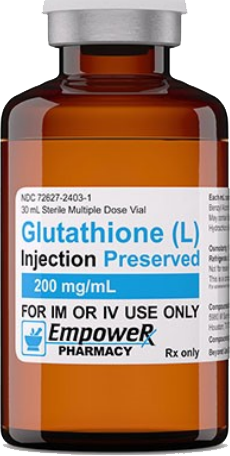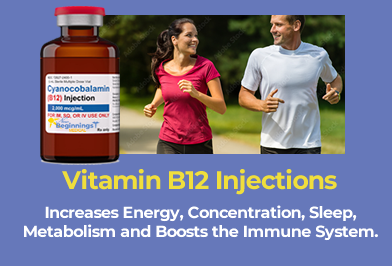
Home » Anti Aging » Glutathione Injection
Glutathione Injection
$150.00
$259.00Add to cart
One of the reasons why Glutathione is so important for optimum health is that it’s present in every cell in the body. One way antioxidants like glutathione help maintain good physical health is by neutralizing free radicals, which can cause cellular dam-
age through oxidation. Since Glutathione is naturally present within all types of cells, it is in a prime position to do this. It’S considered one of the most important antioxidants in the human body.
Glutathione (GSH) is composed of three amino acids combined to produce a peptide that is both a powerful antioxidant and
performs several critical roles in the body. According to researchers this peptide is so essential to optimum health that the
level of Glutathione in cells could possibly be used to predict how long an organism lives.
Glutathione catalyzes Glutathione S-transferases (GST) and Glutathione peroxidases (GPx). Thus, playing a role in detoxifica-
tion by eliminating toxic electrophilic molecules and reactive peroxides. Glutathione plays a crucial role in a detoxification system that is fundamental in plants, mammals, and fungi. Aside from its detoxification role it is important for a variety of essential cellular reactions. Its presence in the glyoxalase system, is fundamental to DNA and RNA nucleotide reduction. Glutathione is also a constituent in the regulation of protein and gene expression, exchange reactions including thiol to disulfide ratios involve glutathione.
Glutathione can exist intracellularly in either an oxidized (Glutathione disulfide) or reduced (glutathione) molecular state. The
ratio of reduced Glutathione to Glutathione disulfide has been shown to be critical in cell survival, this system is very tightly
regulated. Deficiency of glutathione puts the cell at risk for oxidative damage. An imbalance of Glutathione is present in
many pathologies including cancer, neurodegenerative disorders, cystic fibrosis (CF), HIV and aging. While Glutathione is vitally essential to maintaining a healthy immune system, it isn’t classified as an essential nutrient; this is because the body does create its own supply from the amino acids: L-cysteine — L-glutamic acid — Glycine
Glutathione is an essential molecule required for detoxification. Glutathione acts by assisting the body’s machinery in the removal of harmful destructive oxygen containing molecules. During the body’s normal functioning an excess of oxygen con-
taining molecules are produced, these molecules are typically very reactive with other molecules they come in contact with. In modern biochemistry these are referred to as reactive O2 species.
Reactive O2 species molecules include peroxide (H2O2) and superoxide anions (O2 with unpaired electron) these molecules are very toxic to the cell. The toxicity can be explained by the tendency of these molecules to bind or destroy important biomolecules. The body has a natural system to remove these reactive O2 species. These systems metabolize and scavenge for reactive oxygen species, in a controlled and precise fashion.
The system that removes these toxic reactive oxygen species includes a host of enzymes: Glutathione peroxidase (GPX): GPX
detoxifies peroxides with Glutathione acting as an electron donor in the reduction reaction, producing glutathione disulfide as an end product. GPX is a 80 kDa protein that is composed of four identical subunits. It is expressed throughout the entire body, individual isoforms are present in specific tissues. When the body is in a state of excess oxidative stress the expression
of this enzyme is induced.
Abnormal expression has been associated with a wide variety of pathologies, including hepatitis, HIV, and a wide variety of
cancers, including skin, kidney, bowel, and breast. Glutathione reductase (GR)- catalyzes reduction of glutathione disulfide is
by requires NADPH producing two Glutathione molecules as an end product. GR is a member of the flavoprotein disulfide
oxidoreductase family and exists as a dimer. Expression of GR is upregulated during periods of increased oxidative stress, to
prepare for reactive oxygen species removal. The level at which regulation takes place is at the transcriptional level as well as
at the post translational level. Down regulation of GR production and activity are thought to be associated with cancer and aging.
- Catalase: is involved in detoxification of reactive oxygen species.
- Superoxide dismutase (SOD): is involved in the removal of superoxide species.
Immune Function: Glutathione plays a significant role in immune function. It encourages the T-cell function that’s essential
for a healthy immune system and protects from environmental toxins. Additionally, glutathione is essential in a broad range
of metabolic processes:
- Glutathione acts to neutralize a toxic metabolic byproduct: Methylglyoxal
- Glutathione is involved in the protein disulfide bond rearrangement that is necessary for the synthesis of one third of the
body’s proteins The liver uses Glutathione to help detoxify fats before the gallbladder emits bile, supporting healthy digestion Detoxifica-
tion: Glutathione may also be crucial in the removal and detoxification of carcinogens, and according to recent stud-
ies alterations in this metabolic pathway, can influence cell survival profoundly. Glutathione may be responsible for several vital roles within a cell besides antioxidation:- Maintenance of the redox state (chemical reactions in which the oxidation state of atoms are modified)
- Modulation of the immune response
- Detoxification of foreign bacteria and viruses
Chronic Disease: Research has demonstrated that Glutathione deficiency may be a factor in many chronic conditions; HIV/
AIDS, Alzheimer’s, Parkinson’s disease, asthma, different cancers, cataracts, macular degeneration, open angle glaucoma,
diabetes, and many diseases of the liver, kidneys, lungs, and digestive system.
Depletion Due to Aging and Alcohol Consumption: Glutathione plays a major role in the detoxification of ethanol (consumed
as alcoholic beverages) and people who routinely drink will experience Glutathione depletion. Aging is another factor; as
the body ages Glutathione levels may drop below the level necessary to maintain healthy immune function (among other
processes).
Depletion of Glutathione may also Caused by Other Factors: Besides alcohol consumption and the aging process, there are
other factors that can deplete levels of Glutathione:
- Acetaminophen
- Aspartame
- Benzopyrenes (tobacco smoke, fuel exhaust, etc.)
- Many household chemicals (detergents, fabric softeners, air fresheners, mothballs, cleaners, bleach, etc.)
Fertility: In a study of eleven infertile men, suffering from dyspermia associated with various andrological pathologies – Gluta-
thione was observed to exert a significant effect on sperm motility. Glutathione appeared to have an observable therapeutic effect on certain andrological pathologies that cause male infertility.
Atherosclerosis: In one study, ten patients with atherosclerosis were administered Glutathione which resulted in a significant
increase in blood filtration, in addition to a significant decrease in blood viscosity and platelet aggregation. Consequently,
Glutathione infusion was determined to be an effective method of decreasing blood viscosity while increasing blood filtration.
Dermatological Properties: In a three-month study of female subjects, the women taking Glutathione showed significantly
improved skin elasticity and amelioration of wrinkles compared to test subjects who received a placebo.
Store this medication in a refrigerator at 36°F to 46°F (2°C to 8°C). Keep all medicines out of the reach of children. Throw
away any unused medicine after the beyond use date. Do not flush unused medications or pour down a sink or drain.

